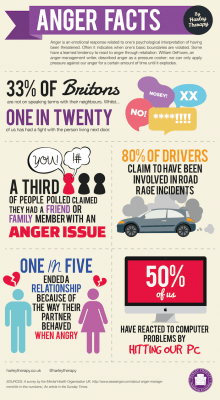Anger Issues – Surprising Signs this Might Be You

By: Phil Whitehouse
by Andrea M. Darcy
Do others see you as a ‘nice’ person? And you are very invested in seeing yourself this way? But then someone close to you has suggested you actually have anger issues?
What are Anger Issues?
Anger issues do not necessarily mean you are always flying off the hook and sabotaging your life with fits of rage.
Anger issues mean that we are not able to express our emotions, opinions, and responses in a healthy way. And for some of us that can mean repressing or avoiding our upset – but at a cost.
The cost of repressed anger can be:
- losing sight of your real self
- an inability to set proper boundaries
- constantly feeling like a victim
- never experiencing the opposite of anger – moments of true happiness.
By blocking the feelings you don’t like, you also, unfortunately, block your other emotions, too.
[Do you know anger is a real issue in your life? Is it time to stop the cycle and get help? Find an online therapist now at a price you can afford now and get talking!].
12 Surprising Signs you have Anger Issues
So if you aren’t the type to yell and scream, what are some other possible signs we have anger issues?

By: KarmaCat_SF
1. You aren’t angry, you are just irritable. Often.
It’s easy to tell ourselves we aren’t the angry sort if we never yell or even raise our voice.
But if you are constantly speaking to others in an irritable way, or, worse, criticising others because of your irritability? Then you are probably sitting on a lot of unresolved anger that’s killing off your compassion.
2. You are never angry. In fact you never have many emotions at all.
Are you the apparently ‘easy going’ type? Who goes along with what others want to do, and when asked if you mind, just shrug and say, ‘I’m not fussed’?
But then are you also the sort who, when asked how you feel, just feel a giant, well… blank? Do you not feel sad, but not that happy either?
If we grew up in a household where we had to be a pleasing child to get by, then we can be so used to not having feelings or showing opinions we mistake this ‘laid’ back version of ourselves for the real thing. Buried deep inside we hide a rage that we were never loved as we were.
3. You never cry.
When we repress anger, we repress sadness. When you go to therapy you can find you first go through weeks of crying before you reach your anger. Alternately, with those who are quick to anger and rage, therapy can see them go from anger to tears.
The roots of what we are furious about – being belittled or traumatised as a child, being rejected or abandoned, or made to feel not good enough – are also the roots of what we need to mourn.
4. On the rare occasions you are mad, it’s big and embarrassing.
Are you known for an embarrassing once yearly blowout? But it’s usually in private with someone close to you, so you maintain your ‘nice person’ persona?
Think of a giant beach ball. And it’s your job to keep it under water. It takes a lot of focus. Occasionally, despite best effort, the beach ball pops up. Repressed anger can be like that. Sure, it only pops above the surface for a second. But note that ball is big, not small. It’s an issue, no matter how fast we hide it again.
 5. You are scattered and can never think straight.
5. You are scattered and can never think straight.
Going back to that beach ball – think of all the concentration it takes to keep it under water. You can’t look around. You have to keep your ‘eye on the ball’.
Keeping our emotions repressed is similar. It doesn’t leave us with enough ‘brain juice’ to keep everything else organised. This is why unresolved trauma can be linked to, or wrongly diagnosed as, adult ADHD.
6. You feel numb often – friends say you are depressed.
In Western society we’ve created a strange system of making some emotions ‘good’ and others ‘bad’. It’s a false and unhelpful approach, creating shame that leads us to hide our so-called ‘bad’ emotions. The end result is often depression.
We are afraid if we let ourselves be angry our rage will overwhelm us. But if we learn to accept our emotions in the safe environment of the therapy room, instead of rage we learn to express healthy anger and set boundaries.
7. You’ve been told more than once you overreact to things.
You don’t get angry per se but do get very ‘upset’ about things, like, a neighbour walking by you without saying hi, the bus being late….
When we repress emotions they can leak out via behaviours like constantly overreacting.
8. You secretly have weird dreams or fantasies about killing people.
This does not mean you are a bad person. Thoughts are not actions, and most people who have such thoughts were the victim of a trauma. Violent fantasies are a way to process your repressed rage, and it’s more common than you think. But it does mean it’s time to seek support.
9. You are a super nice person. Who just happens to be an alcoholic, or drug user, or workaholic.

By: super awesome
Addictions are at heart a way to avoid pain. For some people it’s actually physical pain, but for must of us, addictions are used to avoid emotional pain.
The more we use, the less we feel. And when the high wears off, there’s our rage, wanting to be heard. So we pour another glass….
10. You are tired all the time, and doctors cant’ find anything wrong. You might also have constant flus and colds.
Again, repressing emotions is a full-time job. And for some people it can translate as physical fatigue, which can wear down the immune system over time.
11. You have muscle tension in your jaw and shoulders, and often have headaches.
These are common ways for repressed anger to manifest in the body. It’s part of why, if we do get angry, we feel so tired and relaxed after – we’ve actually let our body tension go.
12. You overeat, and have long had issues with your weight.
Overeating is an addiction, albeit one of the most socially acceptable ones. And it’s main purpose is to numb out our emotions, including, and often, anger.
We can claim we overeat as we are ‘bored’, but what is boredom, but a panic that if we have nothing to do, our true thoughts and feelings might break through?
This is why dieting often doesn’t work. It doesn’t address navigating the irritability that breaks through when we stop overeating. It is also why some people find counselling, looking at emotions with support and in safety, leads to unintended weight loss.
See yourself in the above? Time to seek support over anger issues? Harley Therapy offers some of London’s best anger management counsellors and psychologists. Not in London? Try our booking site to find a therapist UK-wide, or a Online therapist you can talk to from anywhere in the world.
 Andrea M. Darcy is a mental health and wellbeing writer and a mentor, trained in coaching and person-centred counselling. Find her on Instagram @am_darcy
Andrea M. Darcy is a mental health and wellbeing writer and a mentor, trained in coaching and person-centred counselling. Find her on Instagram @am_darcy




